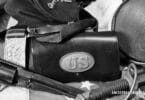The United States has been involved in several declared wars, and numerous military actions (undeclared wars that were wars in all but name) since its founding. Hundreds of thousands of American men, and tens of thousands of American women, have served in these wars in some way. Most families can count at least one military ancestor among their ranks. The service of these people generated records that can tell you a lot about that person, and even entire generations of your family on those particular branches. This is what you need to know about military records in your genealogy research.
Even if your military ancestor isn’t a direct ancestor, you can still collect a lot of information on your family from the military records of a collateral relative. So, don’t discount those ancestors when looking at military records. They can be just as much of a help in your genealogical research as the records of direct ancestors. In fact, it can be a good idea to check the military records of everyone in a particular branch and generation of your family, to be sure you are getting the full picture of your family in that particular era.
You can look for military records online. Both Ancestry.com and Fold3 have excellent military record collections. Fold3 is primarily for military records. Both websites have collections of military records from all of the official wars that the United States has been involved in over the past two and a half centuries. These records range from the actual service records to draft cards, to pension records and requests for both soldiers and widows of soldiers. Both websites are subscription-based, so there is a fee to use them, but you may be able to use a free trial period to examine the records on them.
You can also write to the National Archives (or go there in person) to look for military records. You will need accurate information on your ancestor’s name, what war they served in, and what branch of the military they served in. The people at the national archives will then be able to use this information to direct you to the correct record collection, and you will be able to search that collection for information on your ancestor. Most of the National Archives collections aren’t indexed by name yet (though they are working on it), which makes searching online much easier.
There is a record repository in St. Louis, Missouri that houses records from WWI and WWII (as well as Vietnam, though it was not an official war). Most of the records in that repository were destroyed in a fire in 1973, which is a shame, because the detailed service records of the soldiers were kept there. Yet, you can write to the repository and ask if the medical file is still available, as a lot of the medical files still are there. You can often piece together a military history for an ancestor, and add valuable information to your family tree, simply by using the medical record for a military ancestor.






